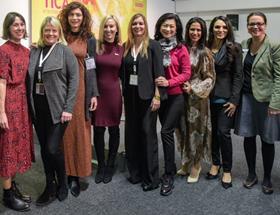
Women wanting to get to the top in the produce industry should be true to themselves and do what they love, but be prepared to work twice as hard as their male counterparts.
That was the core message from a panel of five female business leaders from around the world who addressed the inaugural Global Women’s Network event in Berlin on Friday (8 February) about their career experiences.
Guest speakers Linda Carobbi (corporate director, Savino del Bene, Italy); Michelle Masek (head of marketing, Apeel Sciences, US); Rocio Aguilar (senior export manager, Altar Produce, Latin America); Ebby Loo (managing director, Euro Atlantic Group, Malaysia); and Laura Dellinger (partner, Wisebridge, US) all agreed that being passionate about your role and having integrity was vital to getting ahead in what is still a man’s world. But women must work harder and be prepared to ‘fight’ for a place at the management table, where they are still underrepresented.
“The produce industry is still ruled by men,” Carobbi told a packed audience of men and women from the international fresh produce trade. “It’s almost like we are fighting for a place [at the top]. As women in the industry, we have to be very clear about our objectives and what we want.”
“To succeed [in a male-dominated industry] you don’t need to be aggressive, but you’re going to have to work twice as hard as the men,” Aguilar added.
Women must also overcome self-imposed boundaries that can prevent them from going for the top jobs, and must not be afraid to ask employers for what they want, Masek added.
“Self-advocacy is vital. Ask for what you want, and… ask for what you’re worth,” Masek said. “By removing our own boundaries and having more representation, that’s how we bring about change [in the business sector]. Our biggest enemy is sometimes ourselves. We might be the thing that is stopping us from rocking the boat.”
Women add tremendous value to businesses, since they offer unique skills and a different perspective, the panellists concluded.
“Women are multi-taskers – often juggling a family with work life – and are detail oriented. These abilities are super important in a job, so bring this to the table,” Aguilar said. “Our contribution is super valuable. Men are understanding that they need more women in their companies.”
“Women’s ability to foster connections and see the interconnectedness between different things is starting to be recognised as a key asset and a marketable one,” Dellinger added.
Maura Maxwell – Latin America editor, Fruitnet Media International – expertly chaired the panel discussion, which also touched on tackling gender pay disparity (ask for pay transparency and where you sit on the spectrum); the motherhood-career balance (turn this into a marketable asset); and female solidarity, or lack of it, in the workplace (switch rivalry for support), then invited questions from the audience.
One US delegate asked the panel how the motherhood barrier to female career progression could be overcome, since the burden of childrearing predominantly falls to women and it takes time to catch up with male or childless peers once you’ve exited a job to have a baby.
Masek suggested men and women should hold their companies to account and ask them why they don’t have better paternity policies, since in countries such as Germany where new fathers are entitled to as much as 14 months leave, it is much easier for women to resume their careers after childbirth. “We must involve men in this and other discussions,” she said.
Dellinger added that companies needed to understand that it is much easier to get and retain female talent, than replace it.
A Chinese attendee asked how women could be successful leaders when society expects them to be kind?
“There is a difference between being kind and being nice,” Dellinger advised. “You can say ‘no’ in a kind way. For example, you can tell someone you really like their idea, but you don’t have the capacity to handle it right now.”
“We don’t always have to say ‘yes’ because we are women,” added Carobbi.
The question-answer session was followed by a networking break in which Global Women’s Network attendees were encouraged to share their career stories with each other over a glass of champagne, and be frank about any difficulties they have encountered.
Fruit Logistica provided the platform for the Global Women’s Network event, which met for the first time last week.
Viviane Schappo, Monica Bratuti and Julie Escobar, who combined have more than 25 years’ experience in the international fresh produce trade, launched the initiative at the Berlin trade show in a bid to connect and empower women in the global industry.
“We are incredibly excited to see the responses to this event from women around the world,” said Escobar. “The amount of positive support and desire out there from women in our industry who want to belong to a bigger global network is amazing.
“Our global network is, and will be, a platform not only to network around business opportunities, but also to serve as a space for women in the fresh produce industry to get inspired, connect and be transformed into better executive leaders,” she added. “Our goal is to bring speakers to our events who can ‘rock the boat’ and have really impactful conversations around topics that matter to women in business.”
The next Global Women’s Network is scheduled to take place during Asia Fruit Logistica in Hong Kong in September.



